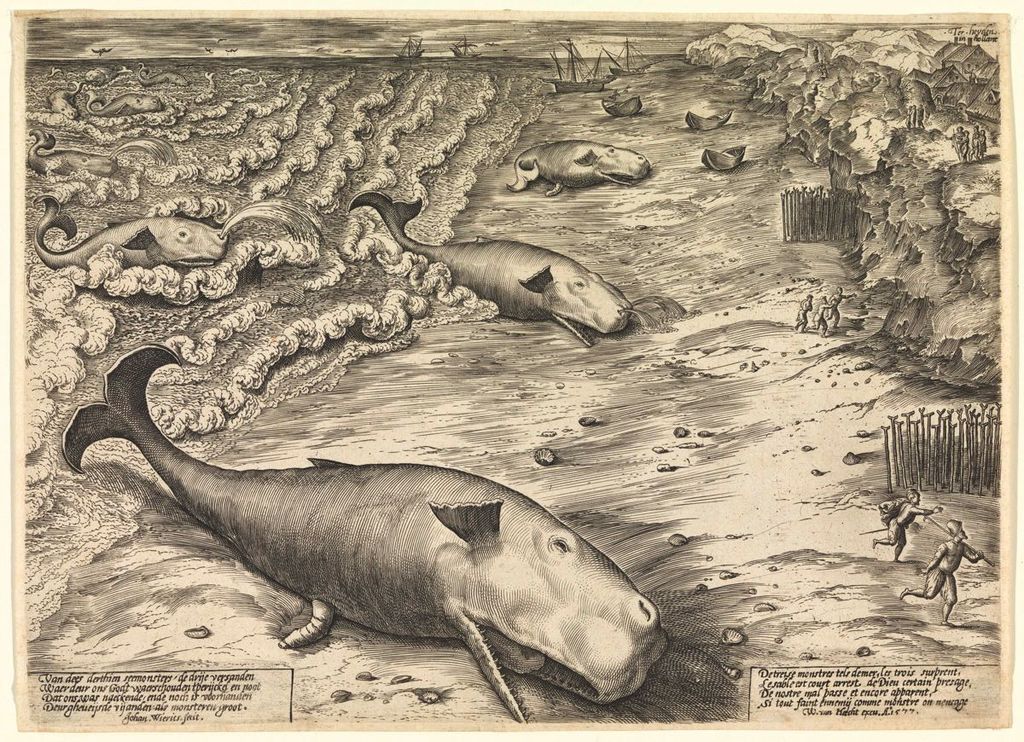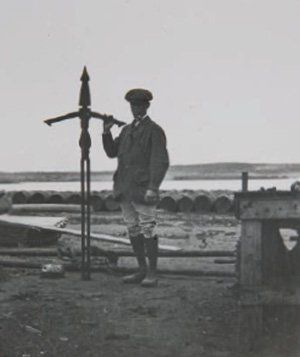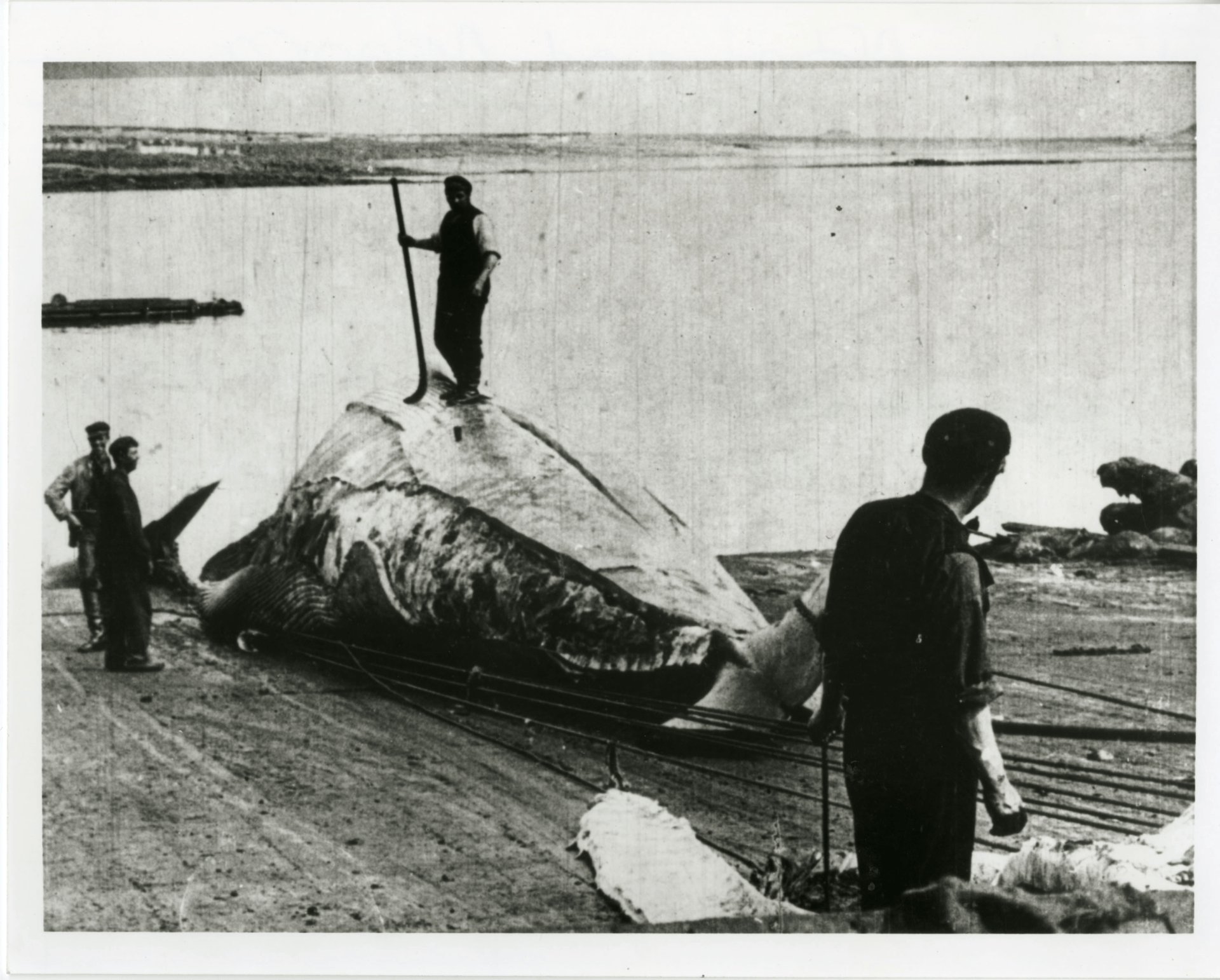A Long History of Whales in Irish Waters!
Did you know that whales have a long history in Irish waters? From the first recorded stranding, to commercial whaling operations and finally Europes first cetacean (whale, dolphin and porpoise) sanctuary!
In 1577, Flemish artist Jan Wierix engraved Three Beached Whales, which depicts three stranded sperm whales.
The history of whales in Irish waters goes way back in time, with stranded whales of great importance in Medieval times. The first record of a stranded whale in Ireland dates back to July 1295, which led to the pleadings of a case in Co. Kerry of Robert de Clohulle who was charged with having appropriated a whale to his own use "in prejudice of the Crown" ( Cal. Just. Rolls Ire.., 1295 - 1303, pages 29, 54-5
). Robert refuted the charge, stating that by Irish ancient custom in Ireland "such great whales are reported wreck of the sea", a right which his father had before him. In September of 1295, William Macronan is reported to have made a fine for "a certain great whale" of two cows and 10 shillings, highlighting the value of a stranded whale.
Almost four centuries later, in 1631, the charter boat of the city of Waterford gave to the mayor "the fishery of salmon and other fish of every kind, although hitherto called royal (whales and sturgeon excepted)". Meaning whales and sturgeons were reserved for the Crown, because of their importance. In 1623, one of the advantages of Eire were said to be the "royalties of whales and sturgeons often taken". Therefore, in medieval times, before ships had the capabilities to hunt whales, stranded whales were highly valued due to their oil and fats (blubber), which were taken for lighting and other uses. The proprietors of many estates had the rights to whales washed ashore and cherished these rights greatly. In fact, if a whale stranded alive, all efforts were made to kill the animal for its oil and fats. For example, Tuckey ( Cal. Just. Rolls. Chas. Ire. 583-4),
described
an event when a 40ft whale swam up the Bandon River, above Kinsale, Co. Cork and was pursued by "the fisherman who struck it several times with harpoons, but to no effect, as it succeeded in getting out of the harbour". Even up to 1965, when a school of long-finned pilot whales ( Globicephala melas)
arrived with the rising tide into the narrow part of Brandon Bay, Co. Kerry, they were killed, cut up and sold.
E.C.B Harpoon – Inishkea Islands, 1908. Photographed by R.M. Barrington
In 1736, Lieutenant Chaplin, quartered at Gibraltar, who has been previously employed in the Greenland whale fishery was informed by a colleague, Captain Nesbit, that whales abounded in the spring of each year off the north-west coasts of Ireland, particularly in Co. Sligo and Co. Donegal (U.J.A.., xiv, 1908, 16-18)
. Chaplin went on to establish Ireland's first whaling station at St. Johns Point, Co. Donegal, and while petitioning for a fisheries grant, he had "struck several whales" over eight years with his fleet of four boats and six men per boat, however, he was only successful in killing two. Of the captures, was one whale of 42 ft. in length that supplied 14 tonnes of blubber and a large quantity of bone. There were further attempts at developing a whale fishery in 1763, when Nesbit won a grant of £1,000 developed a gun harpoon, but alas, was unsuccessful at establishing the fishery and it was subsequently abandoned after he was nearly killed during his whaling activities.
From the end of the 18th century to the early years of this century, no active whaling was pursued in Irish waters, but in 1908, the Arranmore Whaling Company Ltd. established a shore factory on the south Iniskea Island and was at work before the Whale Fisheries (Ireland) Act and as a result killed 76 whales of 5 species in 1908. A second whaling station was established Ardelly Point, Blacksod Bay, Co. Mayo. Up to 1925 (with the exception of the years of World War I and II), 125 blue whales ( Balaenoptera musculus
) were harpooned 40 miles off the Mayo coast, in addtion to 600 fin whales ( Balaenoptera physalus
) which made 66% of the total landings. Sperm whales ( Physeter macrocephalus
), were hunted beyond the continental shelf edge, while North Atlantic right whales ( Eubalaena glacialis
) and Sei whales ( Balaenoptera borealis
) were also hunted to a lesser degree off the Irish coast as they only passed by about 10 miles off, during a narrow window in the first two weeks of June. Only 6 humpback ( Megaptera novaengliae
) whales were slaughtered over this period which made 1% of the total landings.
The whale fishery in Ireland ended in 1925, due to economic and commercial reasons, and in 1931, the International Whaling Commission (IWC) was established. Subsequently, the establishment of the Whale Fisheries Act 1937 saw the official end of commercial whale hunts in Ireland. However, from 1966 to 1976, Norwegian fishing effort still focused on minke whales and basking shark in offshore Irish waters in the summertime, until the introduction of the Wildlife Act 1976, which gave whales in Irish water further protection. On the 7th of June 1991, all Irish waters within the Irish EEZ (200 miles from the coast) were declared by the Irish government to be a whale and dolphin sanctuary, in recognition of its importance as a habitat for a diverse array of cetacean species (Rogan & Berrow, 1995).
References
:
Rogan, E., and Berrow, S., (1995). The management of Irish waters as a whale and dolphin sanctuary. Developments in Marine Biology,
4
, pp. 671-681.
Went, A. E. J., (1968). Whaling from Ireland. The Journal of the Royal Society of Antiquaries of Ireland,
98
, pp. 31-36.
SHARE THIS ARTICLE
















